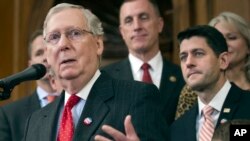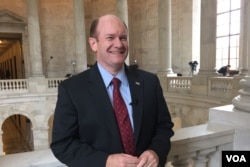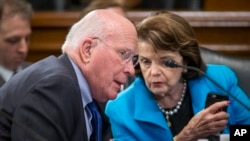President Barack Obama and some top U.S. Republican congressional leaders, often at odds over the president's two terms, agreed this week on how to approach a burgeoning issue confronting Washington: apparent Russian cyberattacks to influence the U.S. presidential election.
Senate Majority Leader Mitch McConnell of Kentucky and House Speaker Paul Ryan of Wisconsin have endorsed investigations into the election. "The Russians are not our friends," McConnell said.
Ryan said the House probe "should not cast doubt" on Trump's victory, but that foreign interference in a U.S. election was "entirely unacceptable" and Russian involvement was "especially problematic."
Obama, in an appearance Monday night on Comedy Central's The Daily Show, explained why he had ordered a thorough review of the Russian cyberattacks.
"The reason I have called for a review is really to just gather all the threads of the investigations, the intelligence work that has been done over many months, so that the public and our elected representatives going forward can find ways to prevent this kind of interference from having an impact on the elections in the future," Obama said.
Russian interference
The Central Intelligence Agency has concluded that Russia interfered in the final stretch of the presidential campaign to help Trump win the presidency, setting up a potential showdown with the president-elect, who has dismissed the CIA findings as "ridiculous."
Experts said Russians hacked the Republican and Democratic national committees' computer systems and disclosed embarrassing emails about the Democrats through WikiLeaks.
Congressional Democrats are also using the intelligence findings to make their own calls for an inquiry into the cyberattacks.
Senator Chris Coons, a Delaware Democrat, told VOA he was encouraged by senior congressional leaders' bipartisan call for both public and classified hearings into the allegations.
"I've heard evidence that convinces me that at the highest level, the Russian government was directly involved in trying to influence the outcome of our election," Coons said. "I think it is a shocking action by the Russian government and something that deserves close consideration, action and response."
Senators Benjamin Cardin of Maryland, Dianne Feinstein of California and Patrick Leahy of Vermont, all Democrats, called Monday for the establishment of an independent panel to investigate the issue.
'Conspiracy theory'
Trump has suggested that Democratic calls for investigations are nothing more than partisan political maneuvering.
"Can you imagine if the election results were the opposite and WE tried to play the Russia/CIA card. It would be called conspiracy theory!" Trump said Monday on Twitter.
The president-elect has repeatedly praised Russian President Vladimir Putin, raising concerns in the U.S. intelligence community that he is disregarding potential threats to U.S. national security.
Coons told VOA the cyber allegations also raised "questions about President-elect Trump's ties to Russia, because he refused to ever disclose his taxes during the course of the campaign."
"We don't really know how broad his complex web of business interests might be and whether or not there are Russian partners or investors that may have some influence over" Trump, he added.
VOA's Michael Bowman on Capitol Hill contributed to this report.







